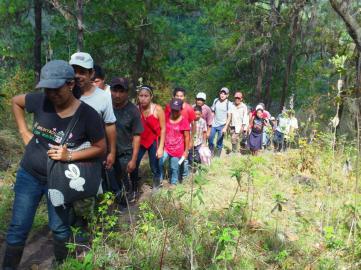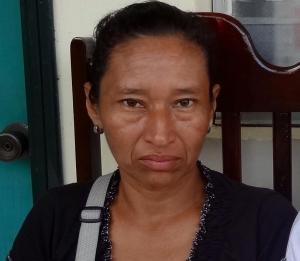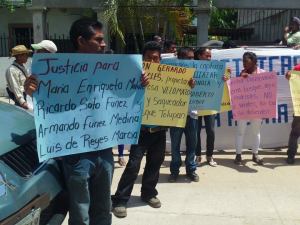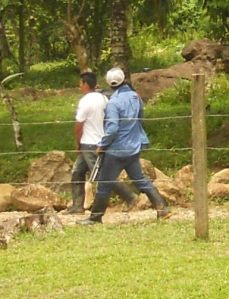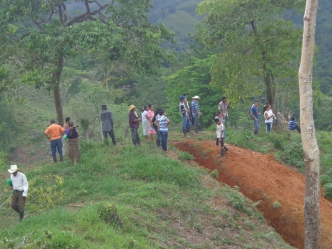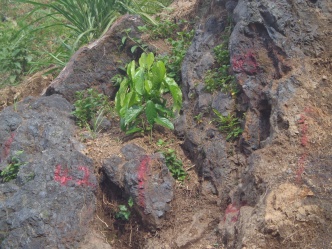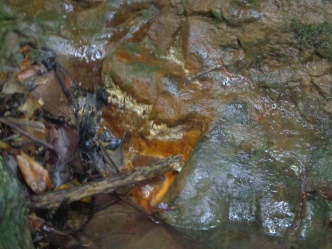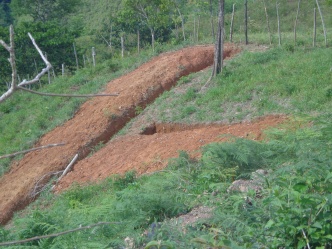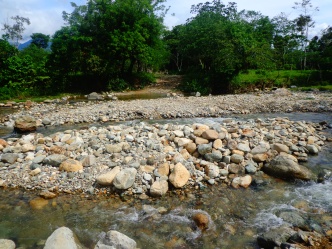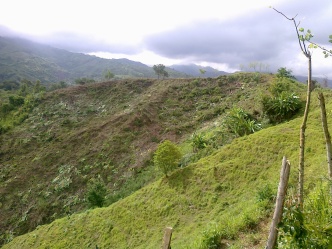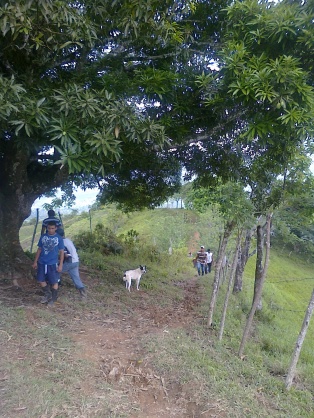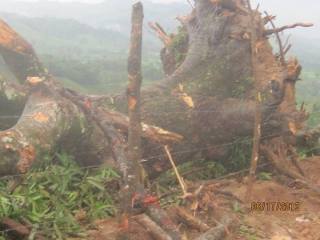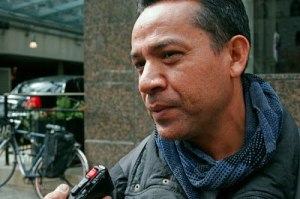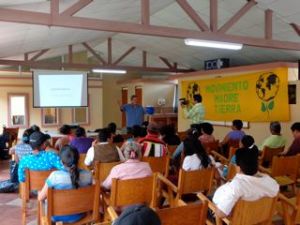The Diocese of La Ceiba called a press conference on 26 June to issue a statement expressing its concern at the mining concessions in the department of Atlántida. The event, held at the bishopric, was attended by priests from the various parishes in the department,and led by Monsignor Michael Lenihan, the Irish-born bishop. PROAH volunteers attended as observers.
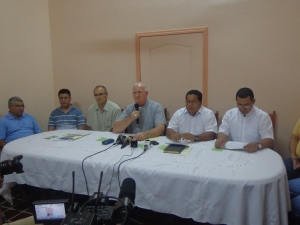
In the statement, the Diocese restates the Catholic Church’s commitment to sustainable development, the protection of the environment and support for the poor as well as highlighting the need to treat natural resources as a common good. It also expresses deep concern at:-
– the environmental and human impact of the mining concessions being granted in the Department,
– the failure of the authorities to consult affected communities, which unanimously oppose the concessions,
– the intimidation of opponents of mining both within the communities and those who support them, and the use of state security forces for repression.
“The blood of mining operations is water”
The statement makes particular mention of La Nueva Esperanza (see our blog posted on 20 June) and expresses the Diocese’s full support for its parish priest, Father César Espinoza, who has been the target of threats because of his support for the community (see El Tiempo article – in Spanish). He, along with the rest of the Diocese, continues to be firmly opposed to open-cast mining in the region, stating that, because of its impact on springs and river basins, “the blood of mining operations is water”.
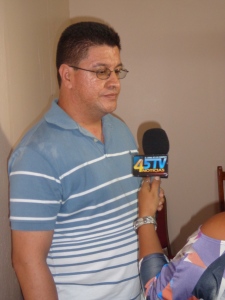
Father César Espinoza who has received death threats
A process “at stalemate”
The Diocese, which has sought to mediate between the affected communities and the mining companies and authorities, organising two meetings between them in April, has taken this unusual step of issuing a statement because it feels that the process has reached a deadlock, with the authorities failing to honour their commitment to provide the communities with full information on the concessions that affect them, while at the same time going ahead with exploration activities which are in themselves damaging to the environment, and allowing the intimidation of the communities by the security forces and armed civilians to continue.
“We’ve organised two meetings with all the parties and there has been dialogue but we’ve concluded that all the communities are opposed to these mining companies” said Father Víctor Cámara, Parish Priest of Jutiapa.
The full original statement is available in Spanish, and in English below and pdf.
STATEMENT BY THE DIOCESE OF LA CEIBA
The Diocese of La Ceiba, fulfilling the mandate of the Diocesan Assembly held on 1 June 2013 at San Isidro parish church, attended by about 120 pastoral workers from every parish, to issue a public statement on the issue of mining throughout the Department, and specifically in the Florida district, in the Parish of Our Lady of the Pillar in Arizona, … would like to inform all People of God, all people of good will, the authorities and the general public that:
1.- WE FIRMLY BELIEVE THAT…
1.- Our earth is God’s creation and gift and we therefore have to treat it with respect. We human beings, created in God’s image (Genesis 1:26), are called upon to be responsible stewards of the goods of creation, we are called upon to “to till it and keep it” (Genesis 2:15).
2.- Jesus made clear with his words and deeds that God is the God of Life (John 10:10). Being faithful to the teachings of the Gospel requires us to regard life as a gift from God in all creation. This integral and interdependent dimension to all of creation means that human beings must act responsibly.
3.- The following of Jesus and the mission are intimately linked. “The mission of evangelization cannot proceed separated from solidarity with the poor and the promotion of their comprehensive development” (AD1 545). For “…the living conditions of many of those who are abandoned, excluded, and ignored in their poverty and pain stand in contradiction to this project of the Father and challenge believers to greater commitment to the culture of life. The Kingdom of life that Christ came to bring is incompatible with such inhuman situations. If we try to close our eyes to these realities we are not advocates of the life of the Kingdom and we place ourselves on the path of death.” (AD 358)
4.- Living in the Spirit of Jesus, we are called upon to reaffirm the option for the poor, vulnerable and excluded, the favoured beneficiaries of the Kingdom and the first victims of the negative effects of the current socio-economic model and the natural disasters caused by global climate change.
2.- WE WISH TO MAKE IT CLEAR THAT…
5.- We do not have the right to exploit the earth’s resources “irrationally demolish[ing] sources of life” (AD 471)
6.- The Social Doctrine of the Church emphasises that “[a] correct understanding of the environment prevents the utilitarian reduction of nature to a mere object to be manipulated and exploited” (CSDC2 463). On the contrary, human intervention in nature must be governed by respect for other people and their rights and for other living creatures (CSDC 459). It also implies taking responsibility for ensuring that future generations can inherit a habitable world.
7.- We reaffirm the need to preserve planet earth as the “shared home” of all living beings. The Blessed Pope John Paul II warned us of the risks of regarding the planet solely as a source of economic resources: “…the environment as ‘resource’ risks threatening the environment as ‘home’”(CSDC 461). For this reason, it is essential to assess the long-term environmental cost of mining activities.
8.- Regarding the activities of extractive industries and the use of non-renewable natural resources, we must bear in mind the principle of the common use of the goods of creation, especially vital resources such as water, air, and land. This is the fundamental principle of the entire ethical and social order (Laborem exercens3 19)
9.- Another fundamental principle of the Social Doctrine guiding the Church in its commitment to promote comprehensive and sustainable development is the principle of the common good. “To desire the common good and strive towards it is a requirement of justice and charity.” (Caritas in veritate4 Para. 7). In addition, “The Church has a responsibility towards creation, and she considers it her duty to exercise that responsibility in public life, in order to protect earth, water and air as gifts of God the Creator meant for everyone, and above all to save mankind from the danger of self-destruction” (Message for the World Day of Peace 20105 Para. 12)
3.- WE ARE CONCERNED ABOUT…AND OPPOSE…
10.- The avalanche of proposed mining projects in our department of Atlántida, which are reported to amount to several dozen, seeking to exploit areas of high ecological value. Atlántida has a unique natural beauty, with 12 areas protected as national parks, accounting for 40% of its territory, it is the region with the highest production of water in the country, and it has a coastline suitable for tourism and with chains of coral reefs. Do we want to jeopardize all this beauty and wealth?
11.- The environmental impact of these projects and the negative consequences for the life of rural communities. So far we have no evidence that environmental impact assessments have been carried out with the participation of those affected. The lack of information in this regard makes us suspect that these supposed environmental impact assessments lack credibility and technical quality. We can not embark on a journey in the name of development that will bring more harm than good.
12.- The lack of transparency and the secrecy with which this process of granting concessions is being conducted, behind the backs of the communities that will be seriously affected, and without informing them. There is the desire to impose these projects on the communities without any consultation and with the excuse that “we have permits” and “it’s legal”. Is it possible to undertake these projects without taking into account the views of the communities? As a Church we say that it is not and oppose this abuse of both individual and collective human rights.
13.- The conduct of the police and state security forces who are biased in favour of those who control capital and wield influence. We do not believe that the police are acting in this case to protect the population, which has always been peaceful, but rather in favour of a party arriving to transgress legal boundaries and its own motto of “protect and serve”. Why are there COBRAs6 in the area with a provocative attitude towards the population which has lived peacefully without a police presence? We object to the State provoking the population in this area with its security forces. We are concerned about the motto of the COBRAs – “Victory or death”? Victory over whom exactly?
14.- The conduct of local authorities which are failing to act transparently, denying the people the right to decide. Why has it not been possible to organize a referendum so that it is the population that makes the decision? Why are operating permits being granted regardless of the views of the communities directly affected? Why are our authorities turning their backs on the people whom they should be serving by seeking the common good? Why this distance and lack of fluid communication with those whom they represent?
4.- WE PROMOTE AND DEFEND…
15.- In fulfilment of its mission to work for reconciliation and unity, for respect for the dignity of each person and the common good (cf Lumen Gentium71), the Church continues to promote open and transparent dialogue between the different parties in society involved in socio-environmental conflicts. In this way the Church wishes to help in each case to stop the escalation of conflict, to prevent the outbreak of violence and to find a just and sustainable solution.
5.- WE REQUEST AND EXPECT…
16.- The Diocese of La Ceiba demands that the State, before authorizing any mining activity:
– Ensures that there is prior consultation with the involvement of the representatives of the villages and communities affected in the decision-making on the potential implementation of such projects.
– Meaningful and reliable Environmental Impact Studies with the participation of the affected communities.
– The Church also demands that the State, through the mining authority, provides the population with adequate information on the results of the study.
17.- That a dialogue is opened up in the area and in the entire Department to reach a consensus on the paths towards equitable, humane and sustainable development. We support tourism in Atlántida, because of both its beaches and mountains, investment in forestry systems, fishing, agriculture and cattle production, handicrafts… Is mining the future for Atlántida? We do not think it is and we know that there is a need to find other viable alternatives, more humane and sustainable, and agreed by consensus.
6.- WE DENOUNCE
18.- The inhumane pressure to which the communities in Florida district are being subjected, particularly Nueva Esperanza, in Tela Municipality, Arizona Parish, Atlántida.
19.- The introduction of high-calibre weaponry into the district, all permitted by and in collusion with the police in the area with the purpose of silencing the voice of communities resisting the imposition by force of a project which threatens their future.
20.- The presence of heavily armed men in the area brought in from outside the district who are threatening all those opposed to the project by acting like hired killers.
21.- The threats to and pressure on community leaders who are giving us lessons in integrity and honesty with their faith and their love of life.
22.- The strategy of divide and rule towards members of communities. The mafia-like strategies of spreading chaos and distrust between people with “informers” “eavesdroppers” etc
23.- The defamation and threats targeted at Fr. César Espinoza and the missionary team at Arizona by unscrupulous businessmen and those groups they have influence over. As the Church of La Ceiba we support Arizona Parish’s pastoral work which is based on a commitment to the poorest, in line with the Church’s rich social doctrine, supporting communities fighting for the right to life and the common good of the population.
7.- WE HOLD RESPONSIBLE…
24.- We do not wish the region to descend into violence…but if it does we hold responsible the businessmen who have acted impetuously and hastily, prepared to do anything to exploit the region against the will of its inhabitants, thereby demonstrating their recklessness and arrogance; those in command of the state security forces for giving orders which jeopardize the safety and lives of simple and peaceful people; the police carrying out orders to act against their own people, serving private interests, and the local authorities for failing to inform and consult the people in a transparent fashion.
8.- WE OFFER…
25.- AS THE CHURCH TO CONTINUE IN OUR EFFORTS TO FOSTER DIALOGUE BETWEEN ALL THE PARTIES AND TO ENSURE THAT WE ALL RESPECT WHAT IS JUST WHICH DOES NOT ALWAYS COINCIDE WITH THE LAWS PASSED.
We ask Saint Isidore the Farmer, lover of the land and patron saint of our diocese, and Saint Francis of Assisi to enlighten us all so that we may find the wisest solution to the problems we are facing. To them we commend ourselves.
Issued in the city of La Ceiba on 26 June 2013
Mons. Michael Lenihan, O.F.M
Bishop Diocese of La Ceiba
Fr. Francisco Sánchez Argueta
Vicar General Diocese of La Ceiba
Fr. René Flores Pineda
Chancellor Diocese of La Ceiba
Fr. Víctor Cámara Cámara
Episcopal Vicar of the Pastoral Ministry
